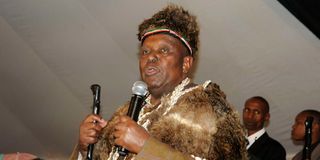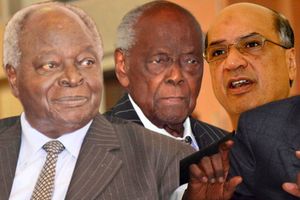
Njenga Karume when he was installed as an elder in the Kikuyu Council of Elders.
The High Court has approved the distribution of the estate of the late politician Njenga Karume to his 10 heirs, bringing an end to a decade-long inheritance dispute.
Justice Patricia Nyaundi approved the division of the estate based on Karume’s written will and a consent agreement signed by family members. She dismissed objections raised by two beneficiaries who felt they had been treated unfairly.
“Nothing has been presented to demonstrate that the proposed distribution is so unequal as to justify interference by the court. The governing provisions to guide the court are Sections 26, 27, 28 and 29 of the Law of Succession Act. The court is required to ensure that reasonable provision has been made for the dependants of the estate,” said Justice Nyaundi of the Family Court Division in Nairobi.

Njenga Karume when he was installed as an elder in the Kikuyu Council of Elders.
The judge issued a grant of confirmation to the executors of Mr Karume’s will – James Raymond Njenga, Stephen Ndung’u Karau and Francisca Wanjiku Kahiu – empowering them to distribute the assets. She ordered the executors to finalise the transmission of the estate within six months.
Mr Karume, one of Kenya’s wealthiest individuals, died on February 24, 2012, leaving behind a vast business empire consisting of nine firms managed through three holding companies: Jacaranda Holdings (hospitality), Karume Holdings (real estate) and Cianda Holdings (agribusiness).
His hospitality empire included Jacaranda Hotels in Nairobi and Mombasa, Lake Elementaita Lodge and the Village Inn. Karume Investments operated Cianda House in Nairobi and several apartment blocks in Nairobi, Limuru and Kiambu. Cianda Holdings managed the Cianda and Kachoraba farms.
In addition to his business interests, Mr Karume served as the MP for Kiambaa from 1980 to 1992 and again from 1997 to 2007, during the presidential administrations of Daniel arap Moi and Mwai Kibaki. He also held positions as assistant minister and cabinet minister in both regimes.
The family of his eldest son, Joseph Karume Njenga, who died in 2010, opposed the distribution of the estate, claiming that they had been excluded and inadequately provided for.
His son’s spouse and granddaughter told the court that the proposed distribution method failed to address their exclusion from the boards of companies affiliated with the late politician, despite other family members sitting on those boards.
However, Justice Nyaundi ruled that the court’s mandate does not extend to the appointment of company directors.
“The protestors, if aggrieved, must present this before the rightful forum as provided under the Articles and Memorandum of Association of the respective companies,” the judge said.

Mr Karume, one of Kenya’s wealthiest individuals, died on February 24, 2012, leaving behind a vast business empire.
They also argued that they had not received compensation for the sale of a plot of land in South C Estate in Nairobi County.
The court heard that the property, which belonged to Karume Investment Limited, had been sold by the executors for Sh79 million.
At a mediation meeting held in September 2018, it was reportedly agreed that the family would be refunded the proceeds from the sale of the South C property.
However, Justice Nyaundi found that the property was not part of the estate and was therefore not available for distribution.
Another point of contention was that they were discriminated against in the distribution of the estate by the determination of the beneficiaries of Joseph Karume Njenga’s estate without their consultation.
However, the judge ruled that there was no proof of the alleged discrimination, and that the dispute over the rightful beneficiaries from Joseph Karume’s family could not be resolved in the current case.
Allowing the distribution, Justice Nyaundi said that the executors had made provisions for the estate's beneficiaries as required by law, including Mr Karume’s children and spouse, as well as the heirs of deceased individuals. She noted that the distribution also honoured Karume’s wishes, as expressed in his will.
One of the executors, Stephen Ndung’u Karau, said that reimbursing Joseph Karume’s family for the sale of the house in South C had not been agreed upon.
“The house at South C was not part of the estate at the time of its sale and therefore the estate cannot be held liable for any refund. In any event, the protestors were not provided for in the will, and in the interest of justice, the family has nevertheless conceded to make provisions for the family of Joseph Karume,” he said.







